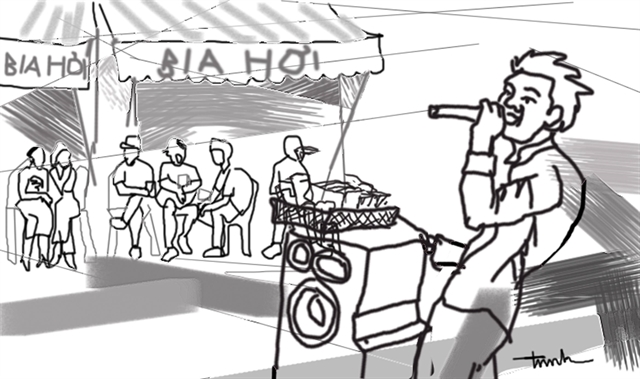 Talk Around Town
Talk Around Town


|
| Illustration by Kiều Trinh |
Khoa Thư
It was midnight and 80-year-old Trần Thị Nguyệt in Đông Hà City, the central province of Quảng Trị, could not sleep.
It wasn't insomnia though, it was the terrible noise from a nearby restaurant that was keeping her up.
As a late-night diner belted out a song, Nguyệt felt her blood pressure rising.
Instead of paying at least VNĐ70,000 (US$3) per hour at a karaoke parlour, many people opt to use portable karaoke machines with a microphone and amplifier to sing anywhere, anytime.
These portable speakers were first introduced to the public by candy vendors.
The vendors would roam around streets at night, pulling the suitcase-like speakers and singing moody Bolero songs in front of restaurants and bars in an effort to sell sticks of handmade candy at VNĐ10,000 (US$0.43) each.
The speakers soon became popular as people jumped at the chance for cheap entertainment for themselves and their families.
Now the speakers have invaded not only urban streets at night but also holiday spots and every corner of the countryside.
“I nearly went crazy as my neighbours sang all day long,” Nguyễn Thu Thuỷ, 25, in Hà Nội’s Hai Bà Trưng District recalled her experiences staying at home during the social distancing period in early April.
“It was fun at first thinking people were trying to stay positive during the troubling time,” she said. “Yet when the clock hit midnight and my neighbours seemed not to want to end their show, it gradually became torture.”
Tensions over noisy speakers sometimes escalate into fighting and even murder.
On April 14, a man in HCM City’s Bình Chánh District was killed after asking his neighbours to lower the volume.
At 3.30pm, 30-year-old Nguyễn Thanh Khoa gathered two friends to drink beer and sing karaoke with portable speakers.
As the noise was too loud to handle, his neighbour, 50-year-old N.V.B asked them to stop. It soon became a quarrel and ended up with Khoa allegedly stabbing B to death. The case has yet to go to trial.
To spare themselves the pain of their neighbours’ broken voices and avoid arguments, many people buy interference equipment which can break Bluetooth connections between portable speakers and TVs or smartphones.
The procurement of these tools, however, has to be approved by the Ministry of National Defence and Ministry of Public Security as criminals can use them to disable security equipment.
On July 9, Tô Thị Bích Châu, head of HCM City Committee of Fatherland Front, asked the city People’s Committee to take serious measures to ban noisy activities in residential areas, mostly due to portable speakers, that have negative impacts on people’s health.
Many are in agreement that something needs to be done, but what exactly the course of action should be is another question.
Huỳnh Thanh Nhân, director of HCM City Department of Culture and Sports, in an interview with Thanh tra (Inspection) newspaper, said although they received many complaints about noise pollution caused by portable speakers, the department does not have any responsibility to measure noise.
According to Government Decree No.155, the natural resources and environment sector is in charge of handling noise.
Meanwhile, Decree no. 167 allows the city’s police to fine violations regarding noise yet fines are small, ranging from VNĐ100,000 to 500,000 ($4.31 to 21.57).
Overlapping responsibilities in addressing noise pollution creates loopholes for the disease of portable speakers to continue spreading.
Đà Nẵng City in May last year became a role model in dealing with portable speakers by increasing the fine. Colonel Trần Thanh Nhơn, head of the Environmental Police Department, said the noisier the activities were, the higher the fines.
The city has shown that it is possible to end noise pollution if there are strong enough mechanisms.
Look at how traffic accidents dropped after the drink-driving law – Decree No 100 – took effect.
Look at how passengers now pay attention to their schedule after HCM City’s Tân Sơn Nhất International Airport turned off loudspeaker announcements.
All we need to fight against portable speakers is determination from the authorities.
And the paean, then, is complete silence. — VNS




